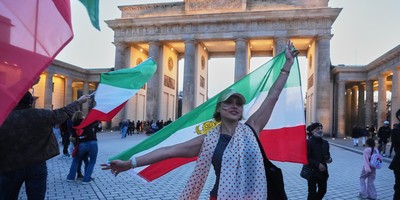President Bush showed the world that it isn't words, but actions, that truly make a difference. Millions throughout Africa would agree.
Mr. Bush recently completed a historic visit to the African continent; a trip he described as "the most exciting, exhilarating, uplifting trip" of his presidency. During his visit, we saw pictures of the president dancing, celebrating and attending ceremonies with heads of state. But the real story is not about just this one trip; it is about the commitment the president made to Africa and what the United States has been quietly accomplishing throughout the continent over the past eight years under Mr. Bush's leadership.
While critics here at home, including many in the press, focused on attacking Mr. Bush at every turn, he steadfastly pushed for greater investments to help the families and businesses of Africa. It's the great untold story that has rarely made headlines here in America, but even so, it has truly changed the world for millions of Africans.
As Tanzanian President Jakaya Kikwete noted, for the people of his country and others across the African continent, Mr. Bush's "legacy will be that of saving hundreds of thousands of mothers' and children's lives from malaria, preventing new HIV infections and giving hope to those infected through care and treatment, and helping millions of young men and women get education." Perhaps most importantly, he adds, Mr. Bush leaves "the legacy of assisting African nations and people [in building] capacity for their own growth and development." Over the last seven years, the U.S. has committed $1.6 billion to trade capacity-building assistance to Sub-Saharan Africa. Moreover, Mr. Bush launched the Millennium Challenge Account as a new model to support governments that commit to ruling justly, investing in people and encouraging economic freedom. In May 2007, he announced the Africa Financial Sector Initiative, which will create seven new investment funds that will mobilize more than $1.6 billion through support of OPIC.
Recommended
In the area of improving health care in Africa, the president's actions are already producing measurable results: nearly 1.5 million people are receiving life-saving antiretroviral medications, HIV infection from HIV-positive mothers has been prevented in more than 150,000 infants and 29 million children have been enrolled in schools, some for the first time in their lives. For Mr. Bush, that's just the beginning. On his recent trip, he announced plans to provide more than 5 million mosquito nets to Tanzanians, as well as a new investment to help eradicate certain tropical diseases.
So why did he do it? As singer-songwriter Bob Geldof pointed out, "There are no votes in helping the poor of Africa, but Bush did it anyway." It clearly wasn't about winning votes or political gain. It was not about fodder for stump speeches and empty promises of hope. Instead of being about catch phrases that simply ring hollow, the president's quiet efforts in Africa have been about action, about compassion and about results.
Mr. Bush's unheralded commitment to helping the people and nations of Africa reminds us that we are the generation who will have it within our power not only to move hearts and minds but also to raise our hands to shape the very future of families, communities and even a continent. The ability to empower others rests not in empty promises or high-minded rhetoric, but rather in real actions that not only change lives, but also change the world.
During my trade mission to Africa as Maryland's lieutenant governor and on subsequent visits, I had the opportunity to witness firsthand how the seeds of empowerment were being planted through market reforms, health initiatives and long-term strategic planning across the African continent. I gained a new appreciation for the kind of business climate that continuing market liberalization and privatization can create, and also for the impact that U.S.-sponsored trade legislation truly offers as a mechanism of support.
Measures such as the Africa Growth and Opportunity Act (AGOA) and Southern Africa Customs Union Free Trade Agreement (SACU-FRA) are making Africa more attractive to American companies who are interested in doing business on the continent. These reforms and the partnerships they foster will shape the economy of both continents for generations to come.
The time is ripe for Africa — and an African renaissance is beginning to emerge across the globe. Because of the efforts of the Bush administration, America will have an important role to play in helping to sustain that renaissance. But it will be equally important for future administrations to appreciate what Mr. Bush's leadership on Africa exemplified: The character of America is not so much revealed in what we say or the public attention we may get, but in what we do when no is watching.

























Join the conversation as a VIP Member